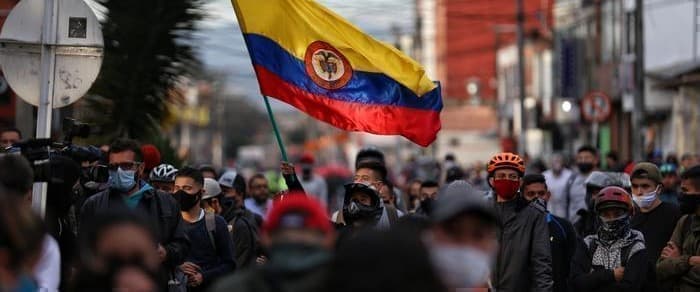Protests across Colombia, which have been raging for almost a month now, are hurting the oil and gas industry as producers are forced to shut in wells because of roadblocks and transport restrictions.
Latin American oil and gas company Geopark announced a reduction in activities owing to difficulties with transportation, drilling, and the mobilization of equipment and personnel. This will mean an average production decrease of around 12,000-15,000 bpd of oil equivalent, a reduction of around 40-45 percent of its normal daily average, the firm has stated.
Protests across Colombia, sparked by a government proposal to increase taxes which have since been dropped, are now in their third week, with no end in sight. These protests, which are taking place in towns and cities across the country, have had a significant impact on several industries, blocking key transport links and hindering other services.
It is not only GeoPark that has stated the need to curtail activities during these protests, Canadian independent Gran Tierra also expects to reduce its oil output by 5,250 bpd, or 18 percent. Gran Tierra expects production to average its 2021 aim of 28,000-30,000 bpd should talks between the government and community leaders to end blockades succeed. However, until the protests ease it looks as if production levels will continue to be affected.
As well as affecting oil production, several drilling, maintenance, and other associated activities have also been suspended in relation to the protest disruptions. Many products and services, including energy consumption, are having to be reduced as well as several businesses temporarily shutting down.
Emergency deliveries of fuel have been arriving from Ecuador as the government works with state-controlled Ecopetrol to tackle fuel shortages across the country. The transportation of food and medical supplies has also been affected by the demonstrations.
At present Colombia’s biggest oil producer Ecopetrol is maintaining its normal output of 675,000 bpd average. "We have faced some obstacles in the south of the country due to blockades in the Putumayo zone, but the principal oil fields where the company extracts the bulk of its production are operating", an official explained.
Toronto-based Frontera Energy also appears to be maintaining its typical production levels in its Colombia operations. However, as many other economic sectors are being affected, the protests are likely to have a spillover effect on the oil and gas industry as a whole.
This is not the first time Colombia’s industries have been hit hard by political unrest, with these protests representing the third time in just two years that civil unrest has broken out in the country. For Latin America’s third-largest oil producer, the threat of further protests only adds to the difficulties faced during the Covid-19 pandemic for the sector.
Colombia’s finance minister José Manuel Restrepo stated last week that demonstrations and blockades could be costing the Colombian economy as much as $132 million a day. This is on top of an already strained economy following a year of pandemic restrictions leading to low incomes and increased unemployment.
The second wave of coronavirus infections, which hit Colombia earlier this year, was expected to delay economic recovery substantially. In February, the central bank lowered predictions for economic growth from between 3 and 7 percent to between 2 and 6 percent for 2021, based on the ongoing effect of the pandemic on the country’s economy.
As Colombia rolls out its vaccination scheme, it looks like the economy may finally begin to pick up again as businesses reopen and tourists begin to return in the summer months. However, the government must come to an agreement with the protesters, establishing a long-term solution to the public complaints, if it hopes to stabilize the economy by the end of the year.
By Felicity Bradstock for Oilprice.com
More Top Reads From Oilprice.com:
- Russia Is Making A Mad Dash To Outrun Peak Oil Demand
- OPEC’s Oil Exports Are Surging By 1 Million Bpd In May
- Is This One Of The Best Ways To Play The Electric Vehicle Boom?


















